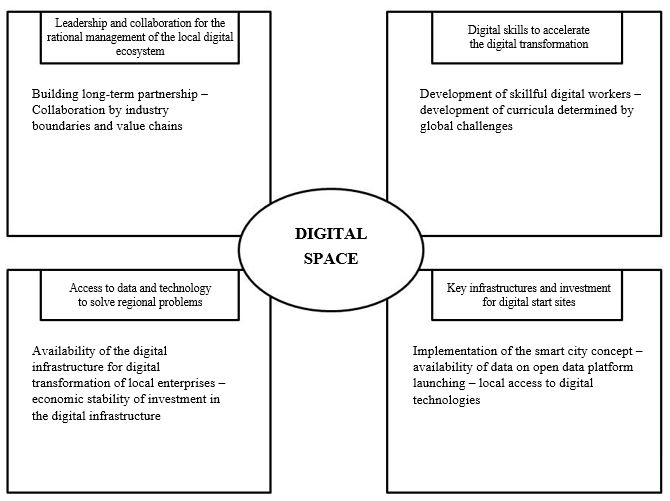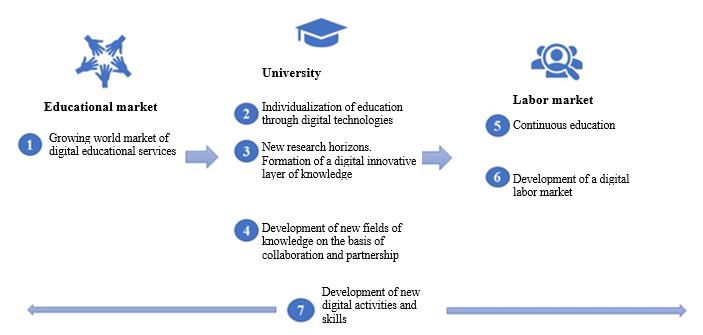Abstract
While many developed countries can exploit traditions and reputation of their educational systems and institutions, emerging markets are catching up with them in the era of digital globalization. New forms of collaboration are required to ensure bootstrapping and accelerate benefits for all subjects. Under globalization, it becomes impossible to track the scale of digital technology coverage in all spheres. The digital environment is determined by a new vector of development, which involves integration into a new automated space based on big data, the Internet of things, cyberphysical systems, virtual and augmented reality, etc. Impacts of digital transformation on the education system are identified and investigated at the national and regional levels. The scientific and technological progress changed the educational environment by developing the Internet as a result of the online education. It should be noted that on the periphery of the digital revolution, the educational environment acts as an object of digitization, a system within which the processes of implementation of new technologies take place, and a subject of the digital revolution.
Keywords: Digitalizationeducational platformdigital universitydigital platformeducation
Introduction
Transformation into a new technological era is being isolated on a global scale and determines the development vector of countries and their regions and cities. Digital transformation embracing social, economic, urban, mobile, educational, technological and cultural changes (Ahmad, Gu, & Sumner, 2006). The concepts of smart infrastructure highlight the key investment flows accumulated as part of the transition to the digital environment through the use of cloud technologies, virtual and augmented reality, the blockchain, the Internet of things, etc (Konopko, 2019).
Problem Statement
Since there is an imbalance in the territorial development of countries, there is a problem of the dynamics of their transition to a new digital space, as a result of which the transformation process is uneven. Positioning itself as a digital launching pad entails the creation of an environment to accelerate the digital transformation of business, education and government. It is necessary to change the regional ecosystem and services delivered by the government, business and educational institutions (Mikhailushkin, 2018).
Digital platforms are based on four basic principles presented in Figure

1. Leadership and collaboration for the rational management of the local digital ecosystem. Farsighted, proactive and committed leaders are critical for the implementation of new digital initiatives. They can articulate their vision and draw a picture of the future for their organization and the entire territory. Therefore, people who are able to challenge the current situation, confidently lead and rally participants in different sectors and industries are key for transforming the territory.
2. Digital skills to accelerate the digital transformation. The digital transformation of the territory is possible only if enterprises have talented and skillful workers for implementing technological solutions. Government authorities, universities and research centers should attract specialists, entrepreneurs who are able to radically shape the digital ecosystem of the city.
3. Access to data and technology to solve regional problems. Access to data and technology can be a catalyst for changes. In each organization, digital solutions can replace old and sub-optimal management styles with more effective ones. Digital solutions offer opportunities to improve the way we live and work.
4. Key infrastructures and investment for digital start sites. Physical and digital infrastructures are required to optimize the use of resources and ensure a higher quality of life in each territory. Innovative financial and business models are emerging to finance these costly local technology infrastructures.
The formation of a new layer of digital talents was studied.
Digital talent is the basis of the digital transformation of companies.
Research Questions
The formation of a new layer of digital talents was studied.
Purpose of the Study
The aim of the study is to build a model of a digital university.
Research Methods
As a result of a research the analysis of the main mechanisms of formation of layer of a talented human resource was carried out to an era of digital transformations.
Findings
Digital talent is the foundation of the digital transformation of companies. Digital transformation of the territory is possible only if enterprises have talents for the development and implementation of innovative ideas. Digital talents are crucial for local companies, governments, universities, and research centers which should attract them to shape the city’s digital ecosystem.
Hiring and retaining talents possessing the required mixture of skills have become one of the most important challenges of the European business. In the globalized and hyper-competitive world, talent strategies are a top priority for innovation and business development.
Government agencies have entered the race for global talents trying to find people who can work in the digital divisions of local government.
Digital skills have become the third language, and the age cannot be considered a barrier to gaining knowledge. Digital transformation has identified a vector for the development of regional policies aimed at gaining digital knowledge. As a result, there are new directions in the field of knowledge (Ivanova, 2017). The region that lacks human capital in the global space can lose its competitive advantage.
Government agencies have entered the race for global talents.
When rethinking educational strategies, several aspects need to be considered. The first one is the identification of effective mechanisms at the regional level for the short-term and long-term acquisition of digital knowledge which involves the development of innovative curricula, including short-term ones.
The education sector varies from the preschool to postgraduate levels, and includes lifelong learning; therefore, the scientific community plays a special role. Particular attention is paid to the entrepreneurial environment, whose activities are aimed at updating the creation of startup communities, including incubators and accelerators. Rapid prototyping programs and skills management are the main blocks in the process of digital education.
In developed countries, local governments, educational service providers, and companies are developing collaborative strategies to train new digital talents or to retrain the workforce.
The main trends in the field of digital education are as follows:
1. Wi-Fi technology used to manage specific educational applications;
2. New opportunities for protecting intellectual property objects. Transition from the perimeter-based protection to enhancing cybersecurity: cyber-attackers pose a serious threat to intellectual property of educational institutions.
3. Creation of innovative research centers focused on the industry: although the Internet of things is the main activity, the scope is expanding. It includes any technology that can solve important problems. Innovative research centers as an ecosystem of industry participants are an asset that the public sector and the business environment can access;
4. Multifaceted partnerships. Universities consider their core procurement relationships through the prism of partnership. Universities need true strategic partners who provide cutting-edge technology and innovative knowledge. In this context, partnership models need to be developed and implemented.
The digital generation should collaborate with older generations by adopting skills of creative vision and strategic thinking. The so-called “3G strategy” model is being developed. It reflects the nature of lifelong education through partnership tools of various age categories that exchange experience and knowledge with each other.
The technology has traditionally been an extension tool in teaching and learning, especially in distance learning. Digital education can create an exciting and engaging learning experience, innovative pedagogical approaches, and new business models.
Digitization provides an opportunity to rethink the use of space and people to increase efficiency (Galazova, 2016). In particular, universities have invested in Wi-Fi which can provide a number of new applications and digital services.
New technologies and new digital platforms create a value that was previously impossible to implement. Social media platforms are an example; people want to communicate, but they did not have a platform to do this efficiently until social networks have been created. There are still no platforms for effective cooperation and automation of operations (Novoselova, 2017).
The interest in digital platforms is due to the hypercompetition in higher education. The educational recognize that any infrastructure must be protected from the growing number of cyber threats. Agencies are aware that digital technology provides opportunities to increase efficiency in such areas as energy management, surveillance; it provides opportunities to increase student engagement and research.
Conclusion
Thus, in order to implement digital talent in the era of global transformation, it is necessary to create a new model of higher education institutions, i.e. digital universities. A digital university is an ecosystem depending on the dynamics of the global education market and meeting new demands of the labor market. Education is a continuous partnership process between representatives of different age categories aimed at forming new knowledge and industries in the field of digitalization (Figure

In the new technological era, the educational environment is subjective-objective in nature, since the education system is integrated into the digital space by means of the existing layer. Digital universities are mechanisms which aim to achieve the main goals of digitalization by means of creating a digital layer of talent, both within the whole country and in regions. New skills developed by digital universities are aimed at implementing the process of transformation into a new technological era by means of digitizing the industries of regional systems.
References
- Ahmad, F., Gu, Q., & Sumner, T. (2006). Concept space interchange protocol: A protocol for concept map based resource discovery in educational digital libraries. Lecture Notes in Computer Science, 4172, 471-476
- Galazova, S. S., Biganova, M. A., Pronina, A. M., Zubareva, L. V., & Ovcharova, N. I. (2016). The energy consumption of domestic industrial production as a key factor in their low efficiency, J. of Econ. and Econ. Ed. Res., 17(Special issue 3), 186–199.
- Ivanova, E. A., Mackay, M. M., Platonova, T. K., & Elagina, N. V. (2017). Theoretical basis for composition of economic strategy for industry development. Europ. Res. Studies J., 20(1), 246–256.
- Konopko, E. A., Pankratova, O. P., Nersesyan, E. V., & Abdullaev, J. A. (2019). Training of teachers for professional activity in the digital enviroment of the educational space. CEUR Workshop Proceedings, 2494, 154115.
- Mikhailushkin, P. V., Novoselova, N. N., Shulga, K. V., Kolpak, E. P., & Kabrits, S. A. (2018). Study of the forms and conditions of economic crises in the regional economies of developing countries. Espacios, 39(31).
- Novoselova, N. (2017). Fuzzy semi-supervised clustering with active constraint selection. Communicat. in Comput. and Inform. Sci., 673, 132–139.
Copyright information

This work is licensed under a Creative Commons Attribution-NonCommercial-NoDerivatives 4.0 International License.
About this article
Publication Date
31 October 2020
Article Doi
eBook ISBN
978-1-80296-091-4
Publisher
European Publisher
Volume
92
Print ISBN (optional)
-
Edition Number
1st Edition
Pages
1-3929
Subjects
Sociolinguistics, linguistics, semantics, discourse analysis, translation, interpretation
Cite this article as:
Khubulova, V. V., Smagina, M. V., Marfutenko, T. A., & Ivanchenko, I. V. (2020). Digital Educational Space In The Context Of A New Education Development Model. In D. K. Bataev (Ed.), Social and Cultural Transformations in the Context of Modern Globalism» Dedicated to the 80th Anniversary of Turkayev Hassan Vakhitovich, vol 92. European Proceedings of Social and Behavioural Sciences (pp. 543-548). European Publisher. https://doi.org/10.15405/epsbs.2020.10.05.72

